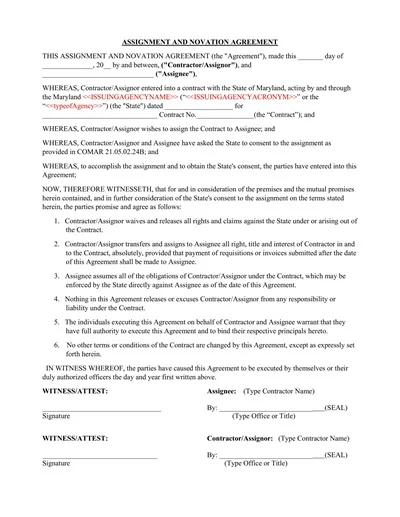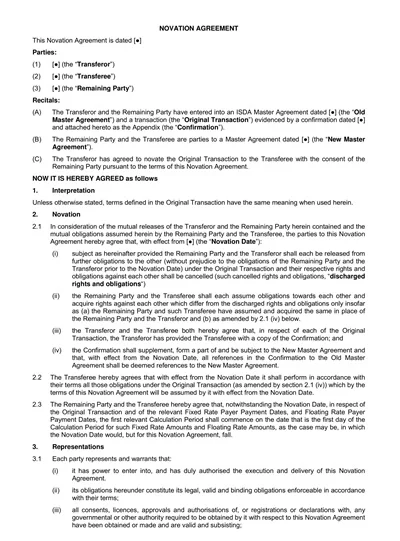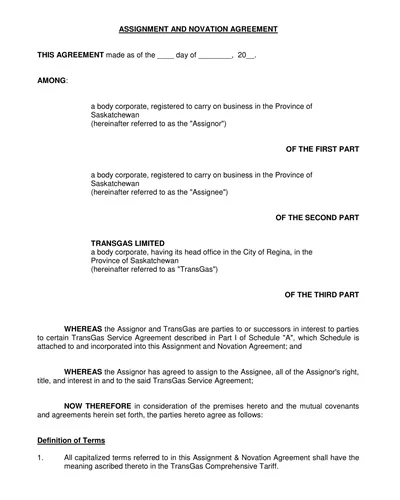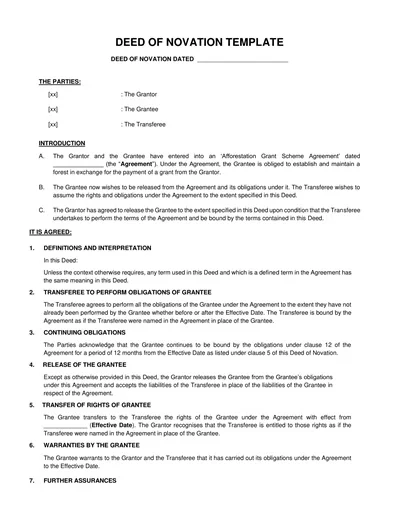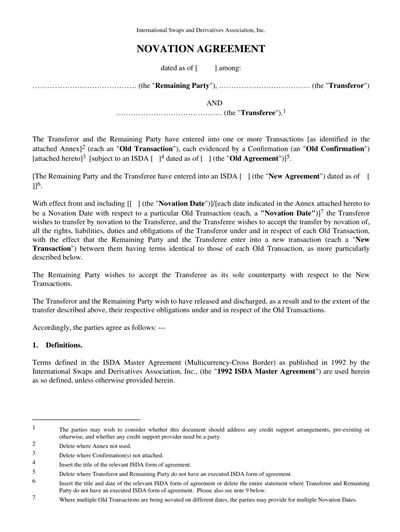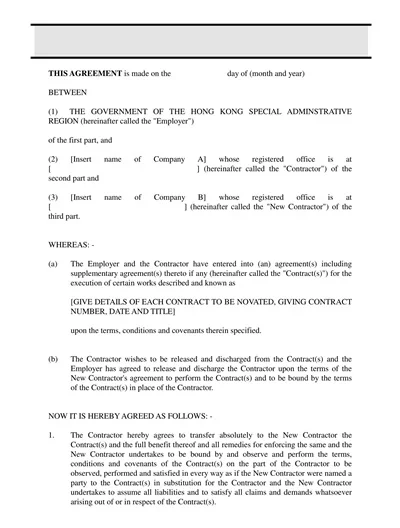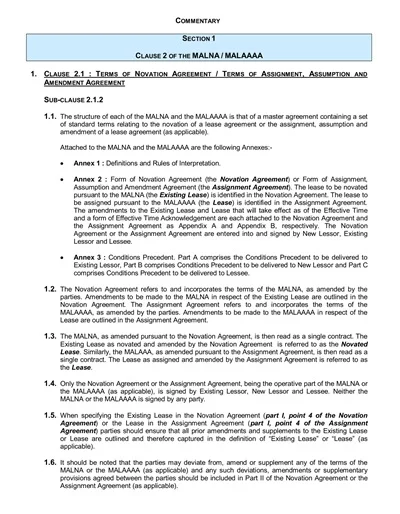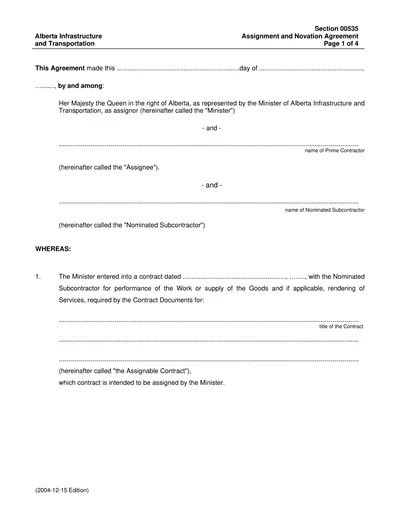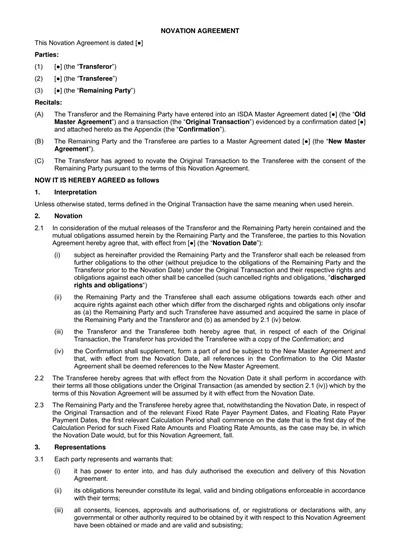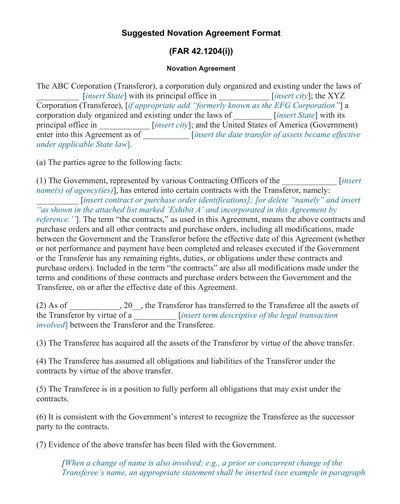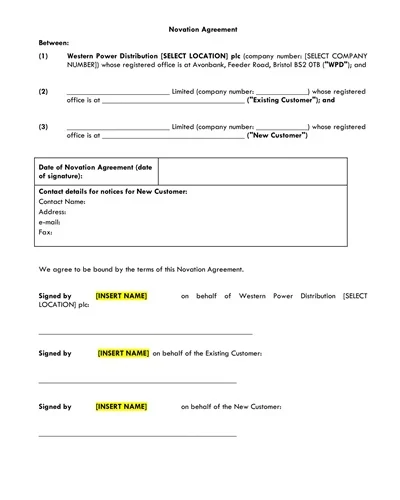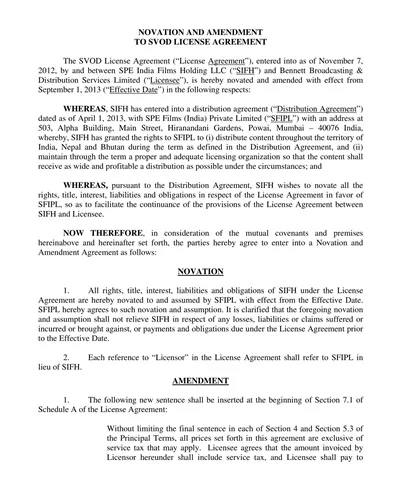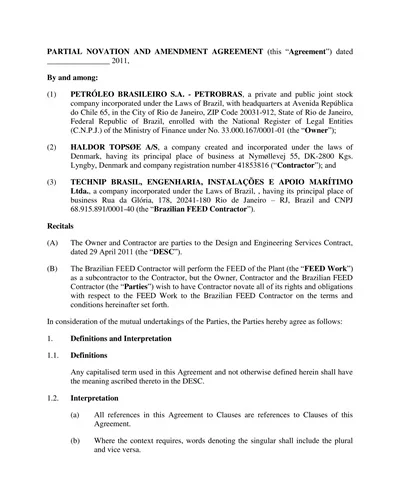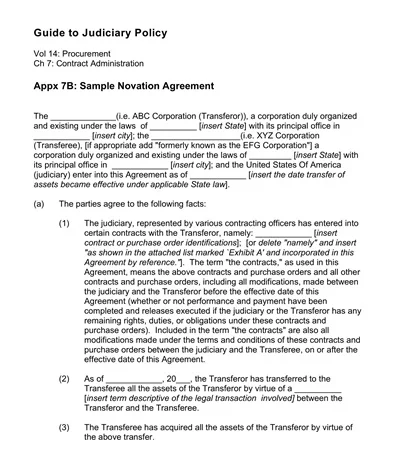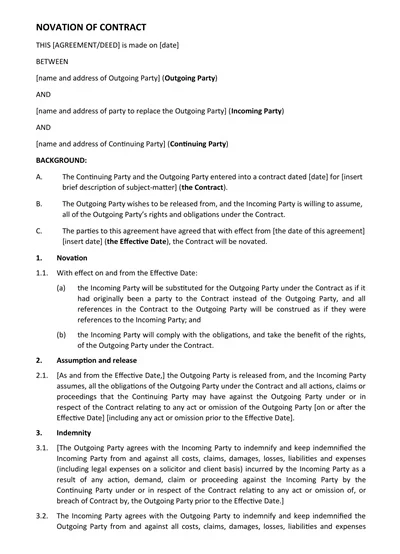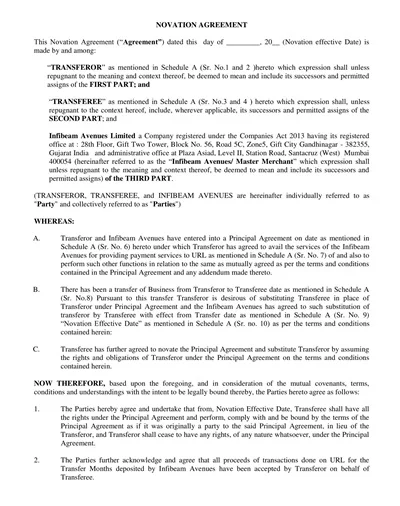30+ Free Sample Novation Agreement Templates (PDF, DOC)
A Novation Agreement Template is a formal document used to transfer contractual obligations and rights from one party to another. This legal instrument facilitates the replacement of an original party in a contract with a new party, effectively ensuring that the original contract’s terms remain intact and enforceable.
In contrast, the initial contracting party is released from all obligations. It is commonly utilized in various business scenarios, such as when transferring lease obligations, service agreements, or restructuring company debts, to ensure a seamless transition of responsibilities and rights.
Download Free Sample Novation Agreement Templates
What is a Novation Agreement?
A Novation Agreement is a legal document that facilitates the transfer of one party’s rights and obligations under a contract to another party, ensuring that the original contract remains in effect but with the new party stepping into the shoes of the original party.
This agreement differs from a simple assignment as it requires the consent of all parties involved, including the one being replaced. Novation is commonly used in business transactions and real estate deals, allowing for the smooth transition of responsibilities and ensuring the original terms of the contract are upheld by the new party.
What is included in a Novation Agreement?
A Novation Agreement is a legal contract that facilitates the transfer of one party’s rights and obligations under a contract to a third party, effectively replacing the original party with the new one.
Key components typically included in a Novation Agreement consist of:
- Introduction of Parties: Clearly identifies the original parties in the agreement and the newcomer assuming the role and responsibilities.
- Consent for Transfer: Formal consent from all original and new parties involved, acknowledging and agreeing to the transfer and novation of the original contract.
- Details of the Original Agreement: Provides a brief description of the original contract, including its purpose, date, and any relevant information necessary for understanding the novation context.
- Rights and Obligations: A comprehensive list of the rights and obligations being transferred from the original party to the new party.
- Warranties and Representations: Statements by the parties that confirm the accuracy of the information given and compliance with relevant laws and agreements.
- Liabilities Clause: Specifies the handling of any existing liabilities under the original contract, often detailing whether they are transferred to or retained by the original party.
- Effect of Novation on the Original Agreement: Clarification that upon the completion of novation, the new party steps into the shoes of the original party in all respects concerning the contract.
- Governing Law: Indicates the jurisdiction under which the novation agreement will be governed and any legal proceedings will be conducted.
This structure ensures a clear understanding between all parties involved, legally formalizing the transfer of responsibilities and obligations.
Common Terms in a Novation Agreement
Aside from the parties involved and their respective obligations and rights, there are several other terms commonly found in a novation agreement.
These include:
Parties Involved
Defines the parties involved in the novation, including the original party wishing to transfer their obligations and rights, the entity taking on these obligations and rights, and any remaining parties whose agreement is necessary for the novation to take effect.
Date of Novation
Specifies the date on which the novation agreement becomes effective.
Original Contract Details
Outlines the details of the original contract, including its purpose, date, and any specific terms relevant to the novation.
New Obligations and Rights
Describes in detail the obligations and rights being transferred to the new party.
Warranties and Representations
Contains any warranties and representations made by the parties involved in the novation agreement. This may include assertions that all parties have the authority to enter into the novation and that there are no legal impediments to the transfer of rights and obligations.
Indemnities
Specifies any indemnities given by the outgoing party to the incoming party or vice versa, particularly regarding potential losses or damages arising from the period before the novation.
Consent
Involves any necessary consents from other entities not party to the novation but whose agreement is required for its validity.
Governing Law
Establishes the legal jurisdiction and the laws under which the novation agreement will be interpreted and enforced.
Requirements for a Valid Novation Agreement
For a novation agreement to be considered valid, several key requirements must be met. These conditions ensure that the contract is legally binding and enforceable:
- Mutual Consent: All parties involved must mutually agree to the novation, understanding the terms and the effect of replacing the original contract.
- Capacity to Contract: Parties must have the legal capacity to enter into a contract, meaning they are of legal age and sound mind.
- Consideration: There must be some form of consideration involved, which could be anything of value exchanged between the parties, as required by contract law.
- Clear and Specific Terms: The terms of the novation, including the obligations being transferred and the party assuming these obligations, must be clear and specific.
- Legality of the New Agreement: The novation agreement must not involve or lead to any illegal activities, and it must comply with relevant laws and regulations.
- Formalities: Depending on the jurisdiction and the nature of the original agreement, the novation may need to be in writing and possibly witnessed or notarized to be valid.
When should I use a Novation Agreement?
A Novation Agreement should be used in specific circumstances where the transfer of obligations and rights from one party to another is desired without creating a new contract. This is particularly crucial in situations where maintaining the essence and terms of the original contract is essential, yet the parties involved need to change.
Here are key situations where a Novation Agreement is applicable:
Business Sales or Acquisitions
When a business is sold or acquired, a Novation Agreement allows for the seamless transfer of service contracts or leases to the new owner, ensuring continuity without the need to renegotiate terms.
Change of Service Providers
Suppose a company wishes to change one of its service providers, such as IT services or cleaning services, but keep the contractual terms the same. In that case, novation facilitates this process by transferring the contract to the new provider.
Property Leases
In the context of property management, a tenant wishing to transfer their lease to another party will require a Novation Agreement to substitute the tenant with the new party while keeping the lease terms intact.
Difference Between Novation and Assignment
Novation and assignment are two key concepts in the transfer of obligations or rights under a contract, but they operate differently.
| Novation | Assignment |
|---|---|
| on the other hand, it does not create a new contract but transfers the rights under the contract from one party (the assignor) to another (the assignee). The obligations under the contract remain with the original party, and the assignee essentially steps into the assignor’s shoes to receive the benefits of the contract. Consent from the party to whom obligations are owed is not always required for an assignment to be effective, depending on the contract’s terms and the nature of the right being assigned. | On the other hand, it does not create a new contract but transfers the rights under the contract from one party (the assignor) to another (the assignee). The obligations under the contract remain with the original party, and the assignee essentially steps into the assignor’s shoes to receive the benefits of the contract. Consent from the party to whom obligations are owed is not always required for an assignment to be effective, depending on the contract’s terms and the nature of the right being assigned. |
How to Create a Novation Agreement Template
Creating a Novation Agreement Template involves several key steps to ensure that all the legal and practical aspects of novation are covered.
Here’s how to structure your template:
- Introduction Section: Start by defining a Novation Agreement and specifying the parties involved (the Transferor, the Transferee, and the Counterparty).
- Recitals: Include a section that lays out the agreement’s background information. This part should describe the original contract and the reason for the novation.
- Definition of Terms: Clearly define all the terms used within the agreement to avoid any ambiguity.
- Novation Details:
- Outline the specific obligations and rights being transferred.
- Indicate any obligations or rights that are not being transferred, if applicable.
- Warranties and Representations:
- Have all parties provide assurances regarding their authority to enter into the novation agreement.
- Ensure all parties confirm that the novation does not breach any terms of the original contract or any laws.
- Consent of the Counterparty: Include a section where the counterparty consents to the transfer of obligations and rights.
- Effect of the Novation:
- Specify the date from which the novation takes effect.
- Clearly state that the transferor is released from their obligations to the counterparty from the date of the novation.
- Miscellaneous:
- Address how any disputes arising from the agreement will be handled (governing law, dispute resolution mechanism).
- Include clauses on amendment, notice, and any other general provisions relevant to the agreement’s enforceability and interpretation.
- Signatures: Conclude the template with spaces for the signature of all parties involved, including the date of signing.
By following these guidelines, you can create a comprehensive Novation Agreement Template that addresses all necessary legal aspects and is tailored to the specific needs of the parties involved.

